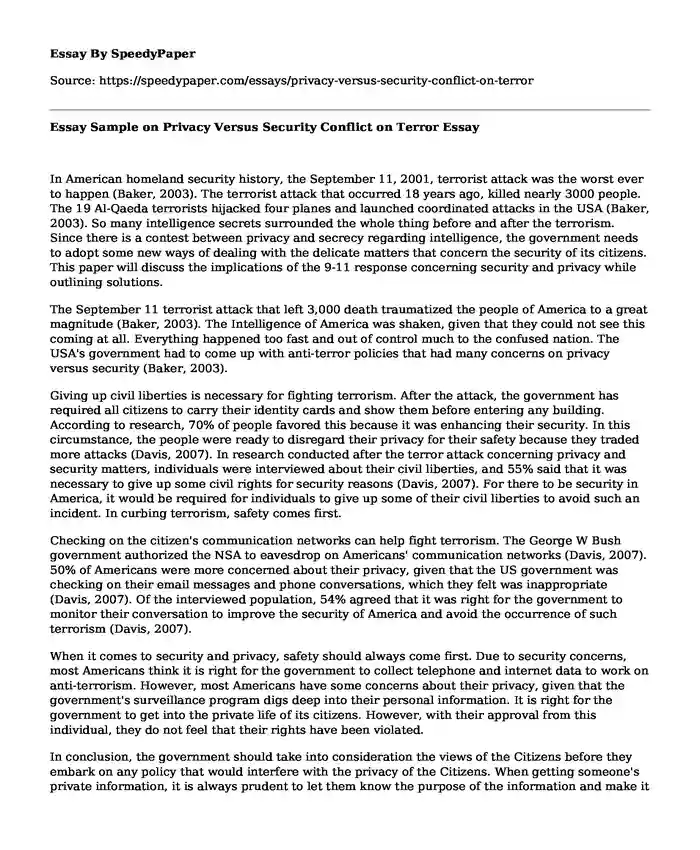
| Essay type: | Argumentative essays |
| Categories: | United States Terrorism National security Social issue |
| Pages: | 3 |
| Wordcount: | 650 words |
In American homeland security history, the September 11, 2001, terrorist attack was the worst ever to happen (Baker, 2003). The terrorist attack that occurred 18 years ago, killed nearly 3000 people. The 19 Al-Qaeda terrorists hijacked four planes and launched coordinated attacks in the USA (Baker, 2003). So many intelligence secrets surrounded the whole thing before and after the terrorism. Since there is a contest between privacy and secrecy regarding intelligence, the government needs to adopt some new ways of dealing with the delicate matters that concern the security of its citizens. This paper will discuss the implications of the 9-11 response concerning security and privacy while outlining solutions.
The September 11 terrorist attack that left 3,000 death traumatized the people of America to a great magnitude (Baker, 2003). The Intelligence of America was shaken, given that they could not see this coming at all. Everything happened too fast and out of control much to the confused nation. The USA's government had to come up with anti-terror policies that had many concerns on privacy versus security (Baker, 2003).
Giving up civil liberties is necessary for fighting terrorism. After the attack, the government has required all citizens to carry their identity cards and show them before entering any building. According to research, 70% of people favored this because it was enhancing their security. In this circumstance, the people were ready to disregard their privacy for their safety because they traded more attacks (Davis, 2007). In research conducted after the terror attack concerning privacy and security matters, individuals were interviewed about their civil liberties, and 55% said that it was necessary to give up some civil rights for security reasons (Davis, 2007). For there to be security in America, it would be required for individuals to give up some of their civil liberties to avoid such an incident. In curbing terrorism, safety comes first.
Checking on the citizen's communication networks can help fight terrorism. The George W Bush government authorized the NSA to eavesdrop on Americans' communication networks (Davis, 2007). 50% of Americans were more concerned about their privacy, given that the US government was checking on their email messages and phone conversations, which they felt was inappropriate (Davis, 2007). Of the interviewed population, 54% agreed that it was right for the government to monitor their conversation to improve the security of America and avoid the occurrence of such terrorism (Davis, 2007).
When it comes to security and privacy, safety should always come first. Due to security concerns, most Americans think it is right for the government to collect telephone and internet data to work on anti-terrorism. However, most Americans have some concerns about their privacy, given that the government's surveillance program digs deep into their personal information. It is right for the government to get into the private life of its citizens. However, with their approval from this individual, they do not feel that their rights have been violated.
In conclusion, the government should take into consideration the views of the Citizens before they embark on any policy that would interfere with the privacy of the Citizens. When getting someone's private information, it is always prudent to let them know the purpose of the information and make it straight how the data will not violate any of the individual's rights. The government should ensure that the kind of information it gets from individuals to be used for security reasons is only used for that purpose and not any other function to secure and protect privacy. Lastly, the government should always assure the citizens that the kind of information they retrieve from them will be protected from third-party infiltration. If this is not done, then the citizens may feel insecure.
References
Baker, N. V. (2003). National security versus civil liberties. Presidential Studies Quarterly, 33(3), 547-567.
Davis, D. W. (2007). Negative liberty: Public opinion and the terrorist attacks on America. Russell Sage Foundation
Cite this page
Essay Sample on Privacy Versus Security Conflict on Terror. (2023, Oct 03). Retrieved from https://speedypaper.net/essays/privacy-versus-security-conflict-on-terror
Request Removal
If you are the original author of this essay and no longer wish to have it published on the SpeedyPaper website, please click below to request its removal:
- Essay Sample on Communication Barriers Between Nigerians and Chinese
- Essay Example Reviewing PR-Related Articles
- Supply Chain Logistics Management Case Study
- Essay Example on Feminism: Fighting for Equality, Rights, and Social Justice
- Beginning of American History - Essay Example
- Nursing Ethics: Facing Challenges of Limited Resources & Workplace Violence
- Free Essay Sample: Reasons for the Use of T-Test
Popular categories




